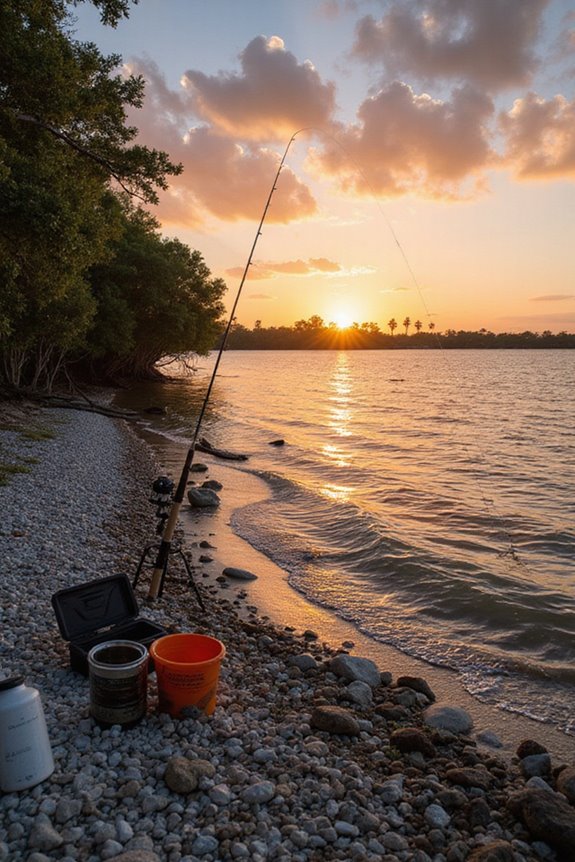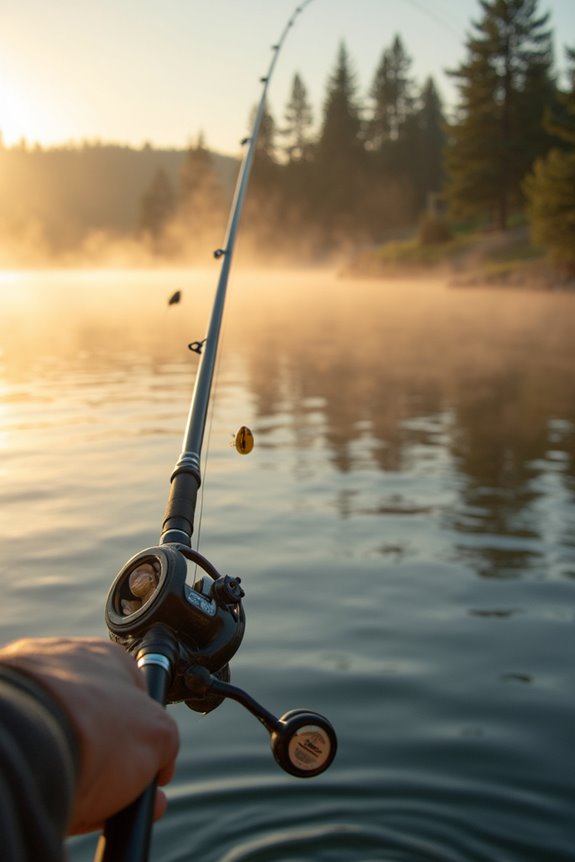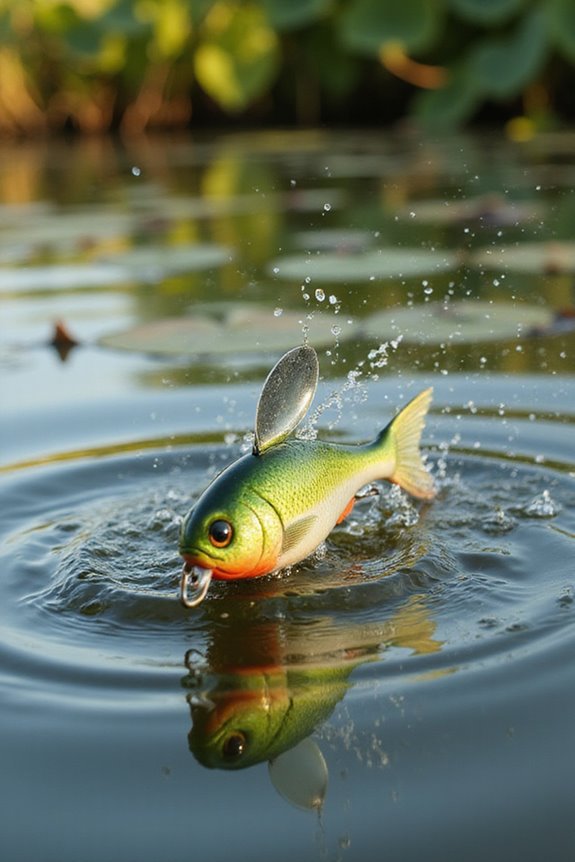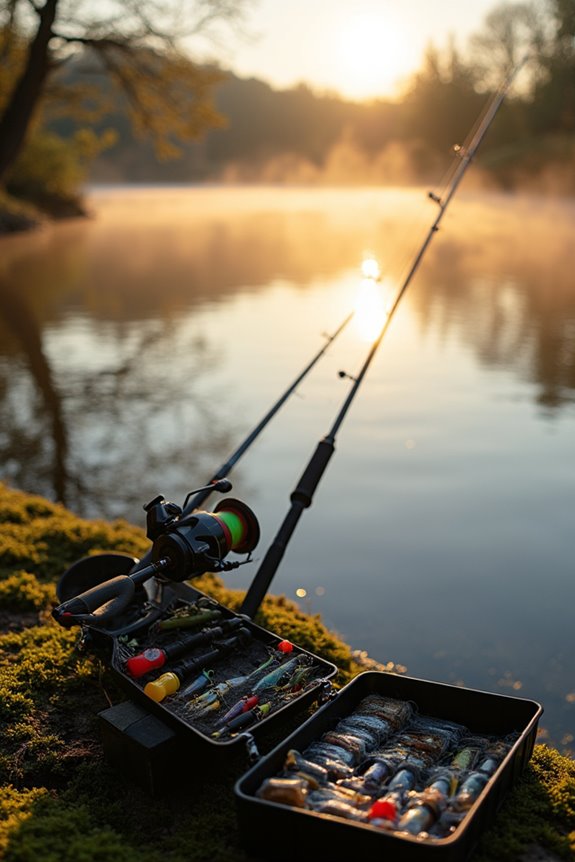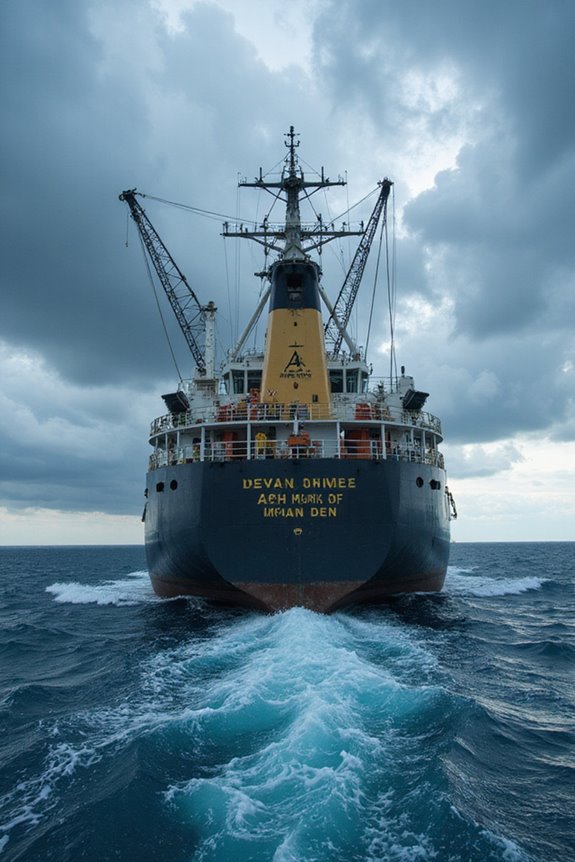In Florida, I need a valid fishing license to fish if I’m 16 or older, regardless of whether I’m in freshwater or saltwater. I must carry my license and a photo ID while fishing. Licenses come in annual or short-term options, including combinations for both types of fishing. There are exemptions for children under 16 and seniors over 65 with proof of age and residency. Knowing the rules and regulations can really enhance my fishing experience.
Key Takeaways
- A fishing license is required for all residents and visitors aged 16 or older in Florida.
- Children under 16 and residents aged 65 or older are exempt from needing a fishing license.
- Active duty military personnel and their families also qualify as residents and do not need a license.
- Proper documentation is necessary to claim exemptions, such as proof of age or residency.
- Fishing without a valid license can result in fines and legal consequences for offenders.
Understanding Florida Fishing License Requirements
When you’re planning to fish in Florida, understanding the state’s fishing license requirements is vital. Both residents and visitors need a fishing license to enjoy recreational fishing, whether it’s in freshwater or saltwater. If you’re 16 or older, you must meet fishing license eligibility criteria. For residents, you’ll need to provide residency verification, which usually involves showing a Florida driver license or ID card. Active duty military personnel and their families can qualify as residents too. It’s important to carry your fishing license and a photo ID while fishing, as law enforcement may check for these. Not having a valid license can lead to penalties, so make sure you’re compliant before casting your line. During emergencies or severe weather events, having NOAA Weather Alerts available can help fishermen stay informed about dangerous conditions while on the water.
Types of Fishing Licenses Available in Florida
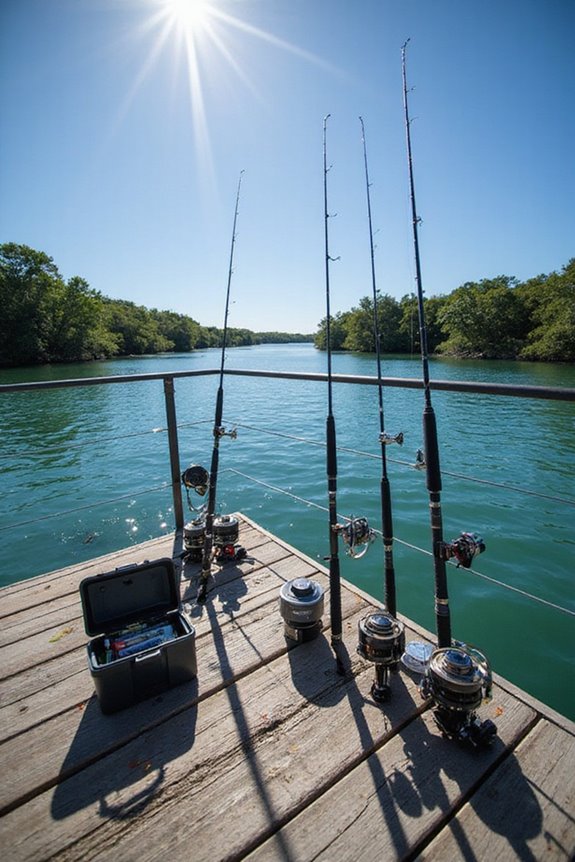
In Florida, understanding the types of fishing licenses available is essential for anyone looking to enjoy the state’s diverse fishing opportunities. There are various fishing license types to contemplate. For freshwater fishing, I can opt for annual or short-term licenses, with options for residents and non-residents. Residents can choose five-year licenses for long-term convenience. For saltwater fishing, I need a separate license, which also offers similar duration options. Combination licenses cover both freshwater and saltwater fishing, often at a reduced cost. Additionally, youth licenses for kids aged 8 to 15 encourage early participation. Lifetime licenses provide permanent fishing privileges, making them an attractive choice for frequent anglers. I recommend checking GoOutdoors Florida for purchase. Proper organization of your fishing tackle bag can significantly enhance your experience on Florida’s waters regardless of the license type you choose.
Exemptions to Fishing License Requirements
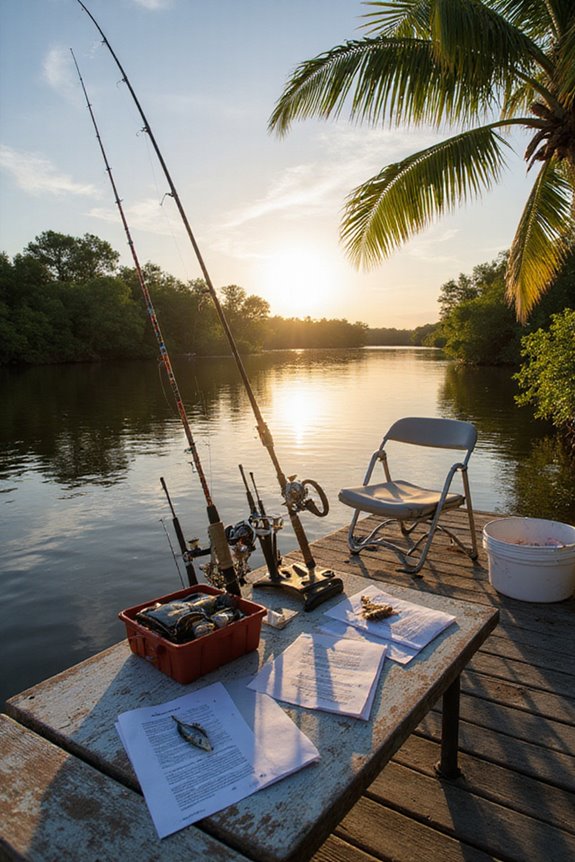
Understanding the exemptions to fishing license requirements in Florida can save anglers time and money, especially for those qualifying under certain conditions. For instance, children under 16 years and residents aged 65 or older don’t need a fishing license. Seniors must provide proof of age and residency to benefit from these age exemptions. Additionally, individuals with disabilities, including those receiving services for developmental disabilities or enrolled in programs like Medicaid, are eligible for disability exemptions. It’s important to have the correct documentation to claim these exemptions, whether fishing in freshwater or saltwater. If you’re fishing with a cane pole in your home county, you might also find yourself exempt from license requirements, making your fishing experience even easier. Many experienced anglers carry emergency whistles for safety while fishing in remote areas, as they can produce sounds up to 120 decibels that carry over long distances.
Importance of Compliance With Fishing Regulations
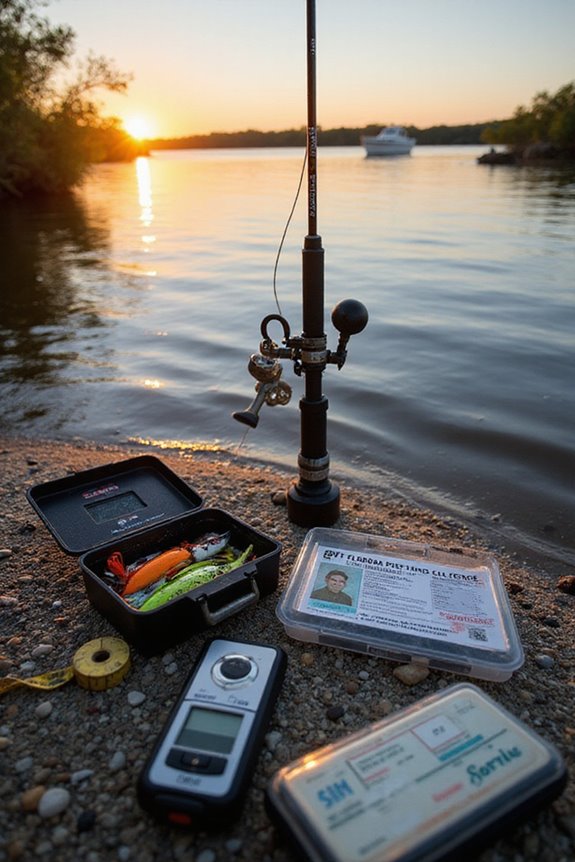
Compliance with fishing regulations is crucial for maintaining healthy fish populations and guaranteeing sustainable fishing practices. By adhering to these rules, we help prevent overfishing, which safeguards the ecological balance of our waterways. For instance, observing size and bag limits allows juvenile fish to mature and breed, supporting future generations. Seasonal closures protect critical spawning periods, which are essential for fish reproduction. Additionally, when we purchase a fishing license, we contribute to conservation efforts, funding scientific research that monitors fish health. Engaging in sustainable practices not only enhances our fishing experiences but also fosters a sense of responsibility toward aquatic ecosystems. By following regulations, we guarantee that fishing remains a viable activity for both current and future anglers in Florida.
How to Obtain a Fishing License in Florida
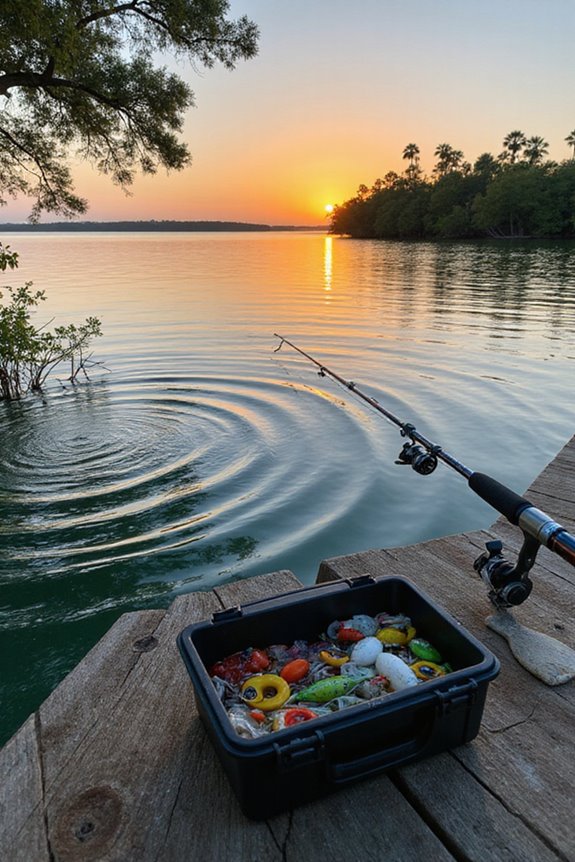
Obtaining a fishing license in Florida is straightforward, and it’s essential for anyone looking to fish legally in the state’s diverse waters. I recommend starting by visiting the Florida Fish and Wildlife Conservation Commission (FWC) website, where you can easily buy licenses online. Local tax collector offices and authorized sporting goods stores also sell them. If you prefer a phone order, you can call 1-888-486-8356 for assistance. Remember, if you’re going on a saltwater fishing charter, you don’t need an individual license, as it covers all participants. However, if you’re fishing in freshwater, each angler must have their own license. Choose the right type based on where you’ll be fishing, whether it’s freshwater or saltwater.
Costs Associated With Fishing Licenses
When you decide to fish in Florida, it’s important to know the costs associated with obtaining a fishing license, as they vary based on residency status and license type. For residents, an annual freshwater or saltwater license costs $17, while a combo option is available for $32.50. Nonresidents can opt for a 3-day or 7-day license at $17 and $30 respectively, or an annual license for $47. If you purchase your license online, be aware of additional online fees, which include a handling fee of $2.25 and a 2.95% surcharge on the total. Understanding these license pricing structures helps you plan your fishing trips effectively, ensuring you’re ready to cast your line in Florida’s waters.
Special Cases and Additional Permits
Fishing in Florida involves understanding not just the costs of licenses, but also the various special cases and additional permits that may apply. Certain individuals, like Florida residents under 16 or those fishing on a direct relative’s homestead, don’t need a license. Military personnel and residents on food assistance can also fish without a license. If you’re targeting specific species like snook or spiny lobster, you’ll need special permits in addition to your fishing license. Remember, fishing from licensed piers may require extra permits. And don’t forget about Free Fishing Days when no license is required, though you must still follow fishing regulations. Always check for any updates on permits through the Florida Fish and Wildlife Conservation Commission.
Species Covered Under Fishing Licenses
Understanding the species covered under fishing licenses in Florida is vital for any angler looking to comply with local regulations. Freshwater species such as largemouth bass, bluegill, and crappie require a fishing license. These fish are commonly found in lakes and rivers, making them popular targets. Saltwater species like snook, redfish, and tarpon also necessitate a license. Anglers often seek these fish in coastal waters and estuaries. Additionally, pelagic species like king mackerel and coastal fish like sheepshead are regulated under saltwater licenses. It’s important to familiarize yourself with the specific species you plan to target, as the licensing requirements vary between freshwater and saltwater environments. Always check local regulations to verify compliance while enjoying your fishing experience.
The Role of the Florida Fish and Wildlife Conservation Commission
The Florida Fish and Wildlife Conservation Commission (FWC) plays an essential role in managing the state’s fish and wildlife resources, guaranteeing they are preserved for future generations while providing benefits for the public. The FWC oversees wildlife management by regulating both commercial and recreational fishing activities. They develop conservation strategies that guarantee sustainable practices, balancing the needs of anglers with the health of ecosystems. The commission conducts scientific research to inform these strategies and promotes public education on responsible fishing. By enforcing fishing license regulations, the FWC helps maintain compliance among anglers. Their initiatives, such as free fishing days, encourage participation while fostering a culture of conservation and stewardship among Florida’s fishing community.
Consequences of Fishing Without a License
Engaging in fishing activities without a proper license can lead to a range of serious consequences that many anglers might not fully appreciate. First-time offenders in Florida face fishing penalties classified as non-criminal infractions, typically resulting in fines between $50 and $100, plus the cost of a license. If you’re a repeat offender, expect escalating legal implications, such as misdemeanor charges, which can include fines up to $500 and potential jail time of 60 days. Not showing up in court or refusing to sign a citation can worsen the situation, leading to increased fines. More importantly, a conviction could suspend your fishing privileges, jeopardizing your ability to fish legally in the future. Always choose to fish responsibly and stay licensed.
Frequently Asked Questions
Can I Fish From a Private Dock Without a License?
Did you know that nearly 50% of Florida’s anglers fish from docks? I can’t fish from a private dock without a license if it’s on public waters, due to private dock regulations and fishing license requirements.
Are There Age Exemptions for Fishing Licenses in Florida?
I’ve learned that Florida’s fishing regulations include youth exemptions, meaning kids under 16 don’t need a license. It’s great for families wanting to enjoy fishing together without the added stress of licensing!
Do I Need a License for Catch and Release Fishing?
Though I love the thrill of catch and release, I can’t ignore the catch release regulations. Even if I think I’m exempt, I still need a fishing license unless I’m part of specific fishing license exemptions.
What if I’M Fishing on a Charter Boat?
If I’m fishing on a charter boat, I’ve gotta consider charter regulations. Even for catch-and-release, I’ll need a fishing license. The fishing fees are worth it for the amazing experience out on the water!
Can I Use My Fishing License From Another State in Florida?
When it comes to fishing in Florida, you can’t use your out-of-state license. There’re no reciprocal agreements here, and you must follow Florida’s fishing regulations to avoid getting into hot water.

